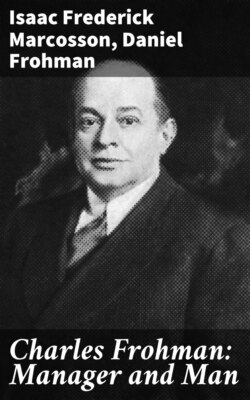Читать книгу Charles Frohman: Manager and Man - Isaac Frederick Marcosson - Страница 7
На сайте Литреса книга снята с продажи.
ОглавлениеOne morning in May, 1881, he received the following telegram from Charles, dated Salt Lake City:
Am stranded here with the "Big Forty." So is Frank Sanger with "A Bunch of Keys." Theater management has failed to send railroad fares. Wire me what you can. Will return amount out of receipts Bush Street Theater.
The manager of the Bush Street Theater, in San Francisco, had agreed to provide railroad transportation for the company from Salt Lake City to San Francisco and had not kept his agreement. The receipts in the former city did not leave a sufficient surplus to negotiate this jump.
Gustave wired the needed cash, and Charles showed up on time in San Francisco. For the second and only other time in his theatrical career Charles was somewhat downcast. Despite his effective services during the preceding years, Haverly had only raised his salary to twenty-five dollars a week. The boy had handled hundreds of thousands of dollars and had helped in no small way to give to the organization its prestige and its esprit de corps. He was now, in the phraseology of his associates, "the whole show." His word was law with the company, and the men adored him.
He met Gustave at the Palace Hotel and said to him, "I suppose the time has come for me to quit Haverly."
"All right," said Gustave, still the good angel. "I'll put you out ahead of our Number Two 'Hazel Kirke' Company at a salary of seventy-five dollars a week. You can start out right away. What do you say?"
Charles thought a moment, and then said: "Well, Gus, it's pretty tough to go ahead of a Number Two company even at seventy-five dollars a week when you have been manager of Haverly's Mastodons. The money doesn't mean anything to me. I like the minstrel boys and they like me."
He still hesitated and walked up and down the room two or three times, as was his habit. Finally he came over to his brother and said, decisively:
"I'll take it."
During this memorable visit to San Francisco occurred another event that had large influence on the whole future life of the young man. One night in a famous ratheskeller on Kearney Street he saw an artistic-looking youth with curly hair and dreamy eyes sitting in the midst of a group of actors. This youth was David Belasco, who had passed from actor to author-stage-manager and whose melodrama, "American Born," was running at the Baldwin Theater. Frohman had seen this play and was much impressed with it. Thrillers had interested him from the start.
Gustave, who was with Belasco, said to him: "There's my brother Charley. You ought to know him."
Simultaneously Belasco was pointed out to Charles. They glanced up at the same time, nodded smilingly across the space between, and later on when they were introduced Charles expressed his great admiration for "American Born." Belasco had just received the offer from Daniel Frohman to come to the Madison Square Theater in New York as stage-manager.
Out of this contact came the association between Charles Frohman and David Belasco that added much to their achievements.
Charles gave Haverly notice, and at Indianapolis he left the Mastodons. He slipped away without farewells, and when his absence became known a gloom settled down on the company. Unconsciously the rosy-cheeked boy had become its inspiration. For weeks the performances lacked their customary zip and enthusiasm.
His minstrel days over, save for two brief intervals, Charles was now about to begin his connection with the Madison Square Theater. It was to mark, because of the men with whom he now became associated and the revolution in theatrical methods which he brought about, the first really significant epoch in his crowded career.
